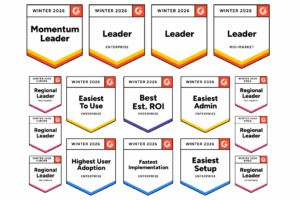Elevating Financial Operations: Automating Beyond Legacy Systems for Greater Efficiency
Blog post
Share
CFOs and CIOs face a daunting challenge: quickly and accurately performing vital accounting and finance tasks using IT landscapes that are cluttered with legacy systems, outdated customizations, and manual processes. The intersection of technology and financial operations is critical, yet often fraught with inefficiencies.
The Challenge of Legacy Systems
Many organizations rely on Enterprise Resource Planning (ERP) systems as the backbone of their financial operations. ERPs play a pivotal role in recording transactional data and financial figures, essential for day-to-day operations. However, these systems often fall short when it comes to specific financial activities, leading to the use of manual workarounds such as Excel spreadsheets. This reliance on disparate systems outside the ERP not only complicates workflows but also introduces significant risks to data integrity and compliance.
The Imperative for Automation
Organizations are increasingly recognizing the need to streamline and optimize their financial processes through purpose-built automation solutions. Unlike merely digitizing outdated workflows, these solutions offer a transformative approach by aligning business processes with best practices specific to each task or role. By automating routine and repetitive tasks, finance and accounting teams can redirect their focus to strategic activities that drive business growth and enhance decision-making.
Benefits of Purpose-Built Automation Solutions
Enhanced Efficiency
Automation reduces the time and effort spent on manual tasks, such as data entry, reconciliation, and reporting. This efficiency gain allows finance and accounting professionals to allocate more time to analysis, forecasting, and strategic planning.
Improved Accuracy
Manual processes are prone to human error, which can have significant implications for financial reporting and compliance. Purpose-built automation solutions minimize errors by standardizing processes and ensuring data consistency across systems.
Cost Savings
Beyond operational efficiency, automation can lead to substantial cost savings by reducing labor costs associated with repetitive tasks and mitigating risks of financial discrepancies. Purpose-built solutions are often modular, which means organizations only need to pay for the functionality they need.
Scalability and Flexibility
As organizations grow and evolve, automation solutions built for the financial close process can scale seamlessly to accommodate increased transaction volumes and regulatory changes. They provide the flexibility to adapt workflows without the constraints imposed by rigid legacy systems.
Data Integrity and Compliance
Compliance with regulatory requirements is critical for finance operations. Automation helps maintain data integrity and ensures adherence to regulatory standards by enforcing consistent processes and audit trails.
Overcoming Implementation Challenges
While the benefits of purpose-built automated solutions are clear, successful implementation requires collaboration between finance and IT teams. CFOs and CIOs must work together to evaluate current processes, identify automation opportunities, and select solutions that integrate seamlessly with existing IT infrastructure.
Key Considerations for CFOs and CIOs:
- Assessment of Current Workflows: Identify areas where manual processes are prevalent and assess their impact on efficiency and accuracy
- Alignment with Strategic Goals: Prioritize automation initiatives that align with organizational objectives and support long-term growth strategies
- Integration Capabilities: Ensure that automation solutions can integrate with existing ERP systems and other critical applications without disrupting ongoing operations
- Change Management: Prepare for organizational changes that accompany automation implementation and provide training and support to ensure smooth adoption by finance teams
The Path Forward
Optimizing workflows through automation represents a significant opportunity for CFOs and CIOs to drive efficiency, enhance accuracy, and empower finance and accounting teams to focus on strategic initiatives. By leveraging purpose-built automation solutions, organizations can mitigate the complexities associated with legacy systems and outdated workflows. The result is a streamlined financial operation that not only meets current demands but also positions the organization for future growth and competitiveness in the digital age.
As you navigate the complexities of modern finance operations, consider purpose-built solutions not just as a technological upgrade, but as a strategic imperative to unlock new efficiencies and elevate your organization’s financial performance. Embrace the transformational power of automation today to pave the way for a more agile, responsive, and successful future tomorrow.


